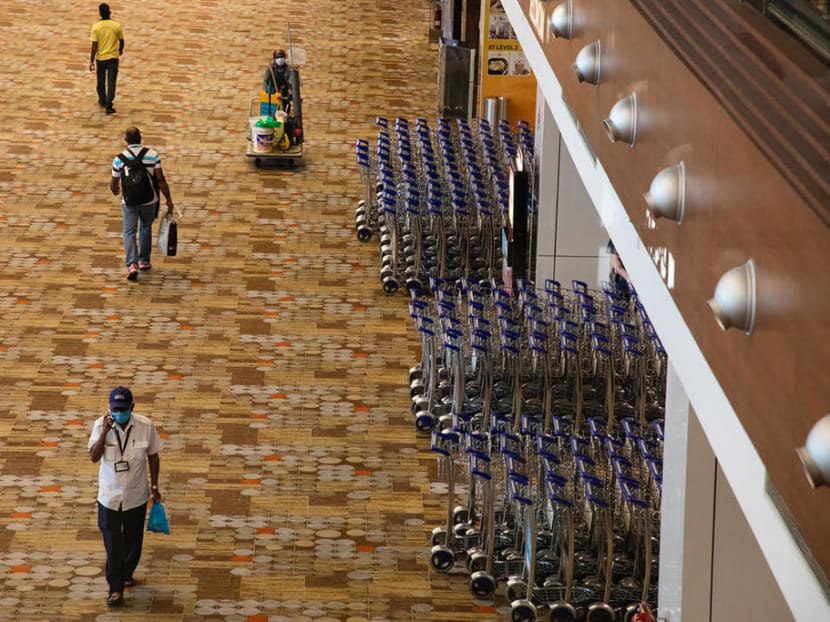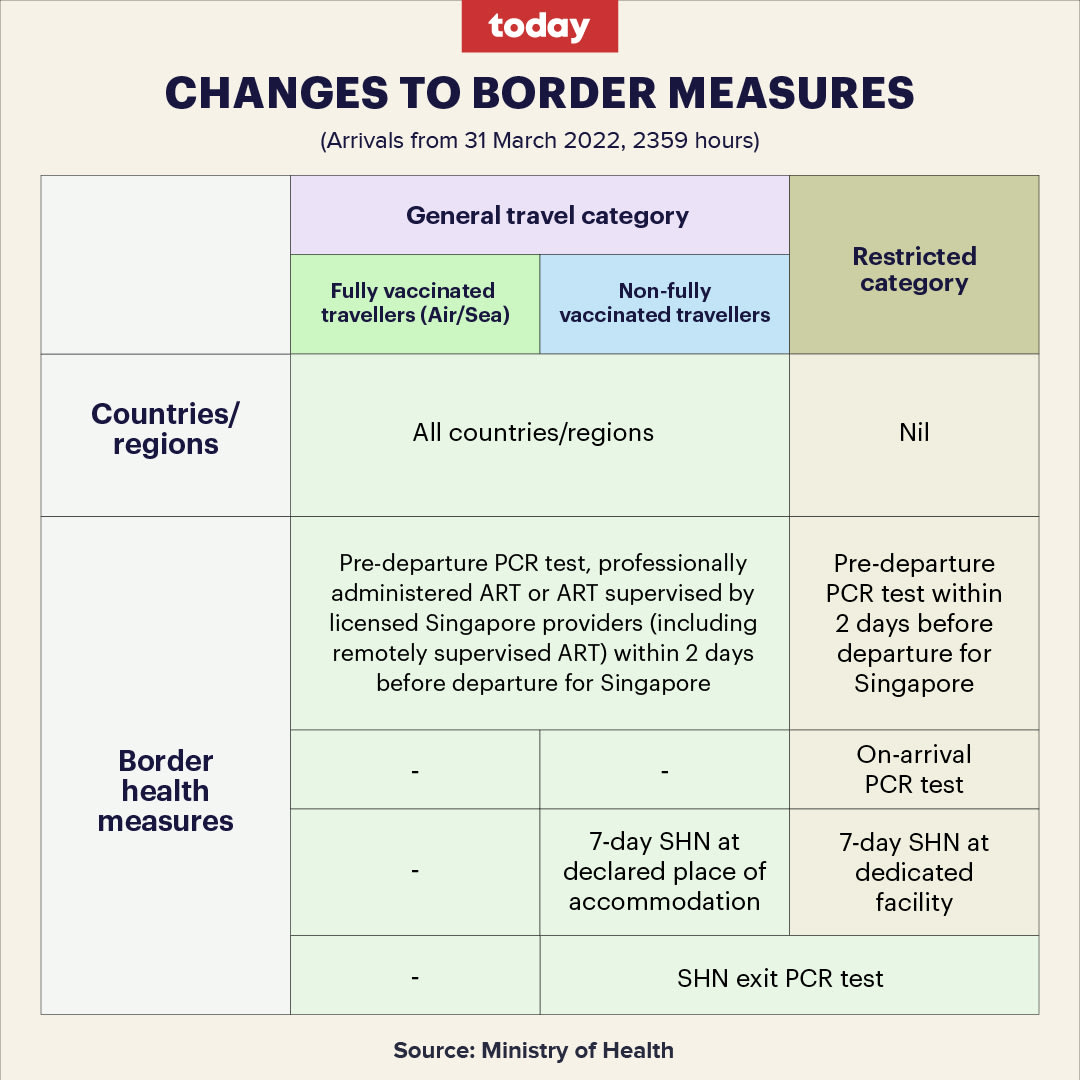S'pore to simplify VTL framework, lift 'most restrictions' for fully vaccinated travellers: PM Lee
SINGAPORE — Singapore will ease up cross-border travel "substantially" with Singaporeans being able to travel abroad "almost like before Covid-19", Prime Minister Lee Hsien Loong said on Thursday (March 24).

Border controls for Covid-19 will be significantly eased to make it easier for Singaporeans to travel abroad as well as tourists arriving in Singapore.
- Cross-border controls for Covid-19 will be eased substantially, Prime Minister Lee Hsien Loong said
- Travellers entering Singapore will be subjected to either of two boarder control categories — general travel or restricted
- Under the general travel category, fully vaccinated travellers will only need to go through a pre-departure test
- For the restricted category, travellers will have to do a pre-departure test, an on-arrival test, be isolated for seven days and be tested again
- There are now no countries in the restricted travel categories
SINGAPORE — Cross-border travel measures will be eased "substantially" with Singaporeans being able to travel abroad "almost like before Covid-19", Prime Minister Lee Hsien Loong said on Thursday (March 24).
Speaking during a national broadcast, Mr Lee said that the vaccinated travel lane (VTL) scheme, which allows vaccinated persons to travel without the need to quarantine, will be simplified and most travel restrictions for fully vaccinated visitors entering Singapore will also be lifted.
The easing of border measures will take place at the same time as the relaxation of infection controls for the community here.
Larger group sizes for social activities will be permitted from next Tuesday and mask-wearing will be optional when one is outdoors.
OMICRON SITUATION UNDER CONTROL
Speaking about the easing of cross-border controls, Mr Lee said that the Government was cautious because of the uncertainty of the Omicron coronavirus' impact at first.
"We were relieved that Omicron turned out less severe than earlier variants, and that relatively few cases were serious enough to need oxygen support or intensive care."
Over the last two weeks, daily new cases have been coming down and the weekly infection rate is now around 0.8.
"At this rate, the number of daily infections will halve in about three weeks," Mr Lee said.
Most Omicron cases here are originating within the community, the situation is "well under control" and arrivals of travellers make up a very small proportion of cases, Mr Lee noted.
"We can therefore safely open up our borders," he added.
"This will reconnect Singapore with the world. It will give a much-needed boost to businesses, particularly the tourism sector, and will help Singapore reclaim its position as a business and aviation hub."
TWO CATEGORIES: GENERAL TRAVEL AND RESTRICTED
From March 31, there will be just two categories for travel into Singapore — the general travel category and the restricted category.
The rules under the general travel category for fully vaccinated travellers and unvaccinated children aged 12 and below are as follows:
- Travellers arriving at air or sea checkpoints will be permitted to enter Singapore without applying for entry approvals
- They do not need to take designated transport under the vaccinated travel lane arrangement
- They must take a pre-departure test within two days before their departure for Singapore
- Upon arrival, they will not need to serve a stay-home notice or undergo an unsupervised antigen rapid test
Individuals who are not fully vaccinated are not allowed to enter Singapore under the general travel category.
However, exemptions will be made for the following groups of people:
- Long-term pass holders who are medically ineligible for Covid-19 vaccines
- Non-fully vaccinated long-term pass holders aged 13 to 17
- Long-term pass holders and short-term visitors with other valid entry approvals, such as for compassionate reasons
People who are exempted will need to take a pre-departure test within two days before departure for Singapore, undergo a seven day stay-home notice and take a polymerase chain reaction (PCR) test at the end of their stay-home order.
Long-term pass holders aged 13 to 17 will also need to complete their vaccination regime in Singapore.
To help Singaporeans, Singapore permanent residents, work pass holders and other long-term pass holders in selected countries who are unable to obtain a pre-departure test, MOH said that it will introduce a remote supervised antigen rapid test service conducted by approved licensed providers here.
Such pre-departure tests will be accepted alongside PCR tests and professionally administered rapid tests.
"In the event of a new variant with potentially significant public health risk, we may re-classify significantly affected countries or regions under the restricted category with stringent border measures," it added.
There are no countries under the restricted category for now, MOH said.
The rules for vaccinated travellers arriving from countries in the restricted category are as follows:
- They must take a pre-departure test within two days before their departure for Singapore
- Upon arrival, they will need to do a PCR test
- They will also need to serve a seven-day stay-home notice at a dedicated facility
- After the isolation period, they will need to undergo an exit PCR test
"This is to enable us to limit the risk of importing new and potentially dangerous variants if they arise, as well as to buy time for experts to better understand the characteristics of these variants and to develop appropriate public health recommendations," MOH said.
MEDICAL BILLS FROM CATCHING COVID-19 OVERSEAS
Singaporeans, Singapore permanent residents and long-term pass holder travellers are now responsible for their own medical bills in hospitals and dedicated Covid-19 treatment and recovery facilities, if they develop onset of symptoms or test positive for the coronavirus within 14 days of their return to Singapore.
However, the Government will streamline the charging policies for travellers depending on which border measures they are subjected to and their vaccination status.
For travellers in the general travel category:
- They will no longer have to pay for medical bills incurred for Covid-19 treatment in hospitals and treatment facilities even if they develop onset of symptoms or test positive within 14 days of their return to Singapore
- This also applies to travellers who are medically exempted from the vaccines and children aged 12 years and below
- Any future changes to the charging policy for community cases here will correspondingly apply to this group of travellers
- Travellers who are not fully vaccinated will remain responsible for their treatment costs, just like the charging policy for unvaccinated individuals who contracted Covid-19 in the community
For travellers in the restricted category:
- Regardless of their vaccinated status, they will have to pay for medical bills in hospitals and dedicated Covid-19 treatment and recovery facilities
- This applies if they develop symptoms or test positive for Covid-19 within seven days of their return to Singapore
Short-term pass holders will remain responsible for any Covid-19 medical bill incurred throughout their stay in Singapore, MOH added.
RESTORING THE CHANGI EXPERIENCE
With the discontinuation of designated travel lane flights, Transport Minister S Iswaran said at a press conference by the national Covid-19 task force on Thursday that airlines may submit their plans to the Civil Aviation Authority of Singapore (CAAS) and operate flights "as they used to pre-Covid".
As for the air crew, they may "also resume normal activities in Singapore or overseas" and will be subject to similar testing requirements as vaccinated travellers, Mr Iswaran said.
TODAY previously reported that rules set by CAAS meant that air crew, including pilots, are largely confined to their hotel rooms while abroad.
Similarly, airport workers will only need to put on surgical masks, except for those in higher-risk roles who must wear a face shield and gloves, Mr Iswaran added. They will not need to do rostered routine testing as well.
Changi Airport will no longer be segregated into zones. Previously, the airport terminals, as well as airport staff members, were split into different zones, each with varying infection prevention and control measures.
Removing these zones will allow all travellers arriving from countries and regions in the general travel category to move about freely in the transit areas.
In addition, Mr Iswaran said that the Changi Airport Group is also progressively reopening the retail and food-and-beverage outlets in the transit areas.
"With these moves, our aim is to welcome airlines back to Singapore, to serve Singapore and the region, raise passenger volumes to at least 50 per cent of pre-Covid levels this year and restore the traveller experience that Changi is renowned for." ADDITIONAL REPORTING BY LOW YOUJIN












